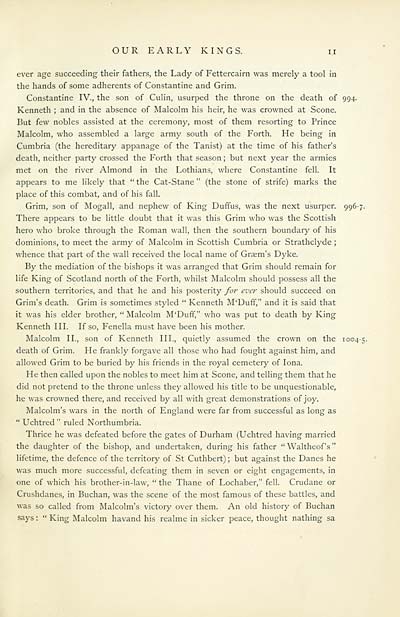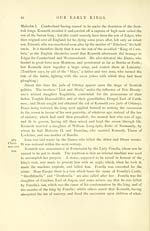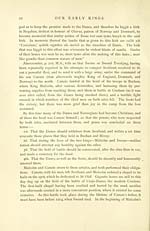Family records of the Bruces and the Cumyns
(23) Page 11
Download files
Complete book:
Individual page:
Thumbnail gallery: Grid view | List view

OUR EARLY KINGS. n
ever age succeeding their fathers, the Lady of Fettercairn was merely a tool in
the hands of some adherents of Constantine and Grim.
Constantine IV., the son of Culin, usurped the throne on the death of 994.
Kenneth ; and in the absence of Malcolm his heir, he was crowned at Scone.
But few nobles assisted at the ceremony, most of them resorting to Prince
Malcolm, who assembled a large army south of the Forth. He being in
Cumbria (the hereditary appanage of the Tanist) at the time of his father's
death, neither party crossed the Forth that season ; but next year the armies
met on the river Almond in the Lothians, where Constantine fell. It
appears to me likely that "the Cat-Stane " (the stone of strife) marks the
place of this combat, and of his fall.
Grim, son of Mogall, and nephew of King Duffus, was the next usurper. 996-7.
There appears to be little doubt that it was this Grim who was the Scottish
hero who broke through the Roman wall, then the southern boundary of his
dominions, to meet the army of Malcolm in Scottish Cumbria or Strathclyde ;
whence that part of the wall received the local name of Graem's Dyke.
By the mediation of the bishops it was arranged that Grim should remain for
life King of Scotland north of the Forth, whilst Malcolm should possess all the
southern territories, and that he and his posterity for ever should succeed on
Grim's death. Grim is sometimes styled " Kenneth M'Uuff," and it is said that
it was his elder brother, " Malcolm M'Duff," who was put to death by King
Kenneth III. If so, Fenella must have been his mother.
Malcolm II., son of Kenneth III., quietly assumed the crown on the 1004-5.
death of Grim. He frankly forgave all those who had fought against him, and
allowed Grim to be buried by his friends in the royal cemetery of Iona.
He then called upon the nobles to meet him at Scone, and telling them that he
did not pretend to the throne unless they allowed his title to be unquestionable,
he was crowned there, and received by all with great demonstrations of joy.
Malcolm's wars in the north of England were far from successful as long as
" Uchtred " ruled Northumbria.
Thrice he was defeated before the gates of Durham (Uchtred having married
the daughter of the bishop, and undertaken, during his father " Waltheof's "
lifetime, the defence of the territory of St Cuthbert) ; but against the Danes he
was much more successful, defeating them in seven or eight engagements, in
one of which his brother-in-law, " the Thane of Lochaber," fell. Crudane or
Crushdanes, in Buchan, was the scene of the most famous of these battles, and
was so called from Malcolm's victoiy over them. An old history of Buchan
says : " King Malcolm havand his realme in sicker peace, thought nathing sa
ever age succeeding their fathers, the Lady of Fettercairn was merely a tool in
the hands of some adherents of Constantine and Grim.
Constantine IV., the son of Culin, usurped the throne on the death of 994.
Kenneth ; and in the absence of Malcolm his heir, he was crowned at Scone.
But few nobles assisted at the ceremony, most of them resorting to Prince
Malcolm, who assembled a large army south of the Forth. He being in
Cumbria (the hereditary appanage of the Tanist) at the time of his father's
death, neither party crossed the Forth that season ; but next year the armies
met on the river Almond in the Lothians, where Constantine fell. It
appears to me likely that "the Cat-Stane " (the stone of strife) marks the
place of this combat, and of his fall.
Grim, son of Mogall, and nephew of King Duffus, was the next usurper. 996-7.
There appears to be little doubt that it was this Grim who was the Scottish
hero who broke through the Roman wall, then the southern boundary of his
dominions, to meet the army of Malcolm in Scottish Cumbria or Strathclyde ;
whence that part of the wall received the local name of Graem's Dyke.
By the mediation of the bishops it was arranged that Grim should remain for
life King of Scotland north of the Forth, whilst Malcolm should possess all the
southern territories, and that he and his posterity for ever should succeed on
Grim's death. Grim is sometimes styled " Kenneth M'Uuff," and it is said that
it was his elder brother, " Malcolm M'Duff," who was put to death by King
Kenneth III. If so, Fenella must have been his mother.
Malcolm II., son of Kenneth III., quietly assumed the crown on the 1004-5.
death of Grim. He frankly forgave all those who had fought against him, and
allowed Grim to be buried by his friends in the royal cemetery of Iona.
He then called upon the nobles to meet him at Scone, and telling them that he
did not pretend to the throne unless they allowed his title to be unquestionable,
he was crowned there, and received by all with great demonstrations of joy.
Malcolm's wars in the north of England were far from successful as long as
" Uchtred " ruled Northumbria.
Thrice he was defeated before the gates of Durham (Uchtred having married
the daughter of the bishop, and undertaken, during his father " Waltheof's "
lifetime, the defence of the territory of St Cuthbert) ; but against the Danes he
was much more successful, defeating them in seven or eight engagements, in
one of which his brother-in-law, " the Thane of Lochaber," fell. Crudane or
Crushdanes, in Buchan, was the scene of the most famous of these battles, and
was so called from Malcolm's victoiy over them. An old history of Buchan
says : " King Malcolm havand his realme in sicker peace, thought nathing sa
Set display mode to:
![]() Universal Viewer |
Universal Viewer | ![]() Mirador |
Large image | Transcription
Mirador |
Large image | Transcription
Images and transcriptions on this page, including medium image downloads, may be used under the Creative Commons Attribution 4.0 International Licence unless otherwise stated. ![]()
| Histories of Scottish families > Family records of the Bruces and the Cumyns > (23) Page 11 |
|---|
| Permanent URL | https://digital.nls.uk/95071262 |
|---|
| Description | A selection of almost 400 printed items relating to the history of Scottish families, mostly dating from the 19th and early 20th centuries. Includes memoirs, genealogies and clan histories, with a few produced by emigrant families. The earliest family history goes back to AD 916. |
|---|

